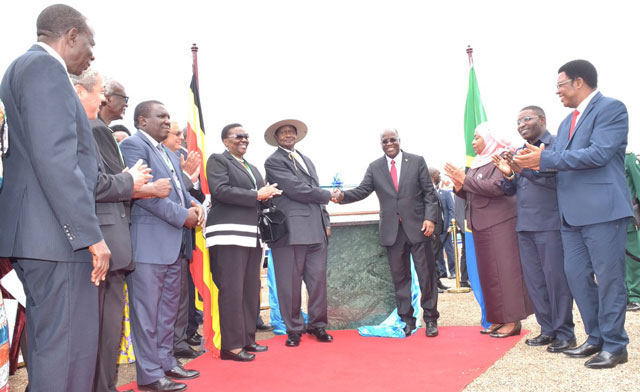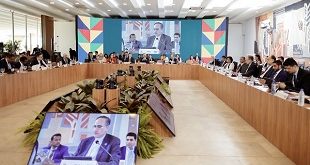
April, 2016: The Government finally chooses the Indian Ocean Port of Tanga in Tanzania as its preferred end point for Uganda’s crude oil pipeline. The decision brings an end to two years of protracted negotiations involving Uganda, Kenya, Tanzania and the three joint oil partner companies.
July 2016: The Russian-led consortium, RT Global Resources withdraws from oil refinery negotiations. The Government restructures the refinery project and immediately goes on another hunting spree for a lead investor
August, 2016: The Government issues eight production licences to Tullow (05) and Total (03). At the issuance ceremony in Kampala, government says it expects the oil companies to produce oil by 2020.
09 Jan. 2017: Tullow enters into an agreement to sell 21.57% of its 33.33% stake in Uganda’s Lake Albert Development Project to its partner, Total, the French oil major for about US$ 900 million.
09 Jan. 2017: The Governments of Uganda and Tanzania alongside the joint venture oil firms launch the FEED study for Uganda’s crude oil pipeline popularly known as the EACOP.
14 Feb. 2017: Irene Muloni, the energy minister flanked by senior managers of the three oil firms in Uganda launch the FEED studies for the central processing facilities in the two oil fields in western Uganda.
May 2017: Uganda and Tanzania sign the Intergovernmental Agreement for the East African Crude Oil Pipeline.
August 2017: The Government selects the Albertine Graben Refinery Consortium (AGRC) to negotiate the project framework agreement for the development of the oil refinery
10 April, 2018: Uganda moves closer to building a US$ 4bn oil refinery in Hoima following the signing of an agreement between the government and the Albertine Graben Refinery Consortium (AGRC).
29 Jan. 2019: The Government announces that it is joining the Extractives Industries Transparency Initiative (EITI)—a global mechanism that requires governments and companies to be open about their oil, gas and minerals deals.
23 April 2019: The National Environment Management Authority (NEMA) issues a certificate of approval to Total E&P Uganda for the Tilenga project following assessment of the project’s environmental and social impact
29 Aug. 2019: Tullow Oil Plc announces that its Sale and Purchase with Total has expired without a deal.
05 Sept. 2019: Total announces that it is suspending all its planned activities on the US$ 3.5bn crude oil export pipeline (EACOP) following the collapse of sale and purchase agreement with Tullow.
09 Dec. 2019: Paul McDade, Tullow Oil Plc’s CEO and Angus McCoss, Tullow’s Exploration Director step down from their positions by “mutual agreement and with immediate effect” sending the company’s shares on the London Stock Exchange on a downward spiral.
09 March 2020: NEMA announces that it has approved CNOOC’s environmental and social impact assessment report for the Kingfisher project.
23 April, 2020: Tullow Oil Plc announces that it has finally reached an agreement to sell its Ugandan assets to Total for US$ 575 million
11 Sept. 2020: The Government of Uganda and Total sign the Host Government Agreement for the EACOP project
21 Oct. 2020: Tullow announces that it has finally reached an agreement with the Government of Uganda and the Uganda Revenue Authority to sell its 33.33% stake of its Ugandan assets at US$ 575 million.
10 Nov.2020: Tullow announces the completion of the sale of its assets in Uganda to Total following the latter’s payment of US$ 500m to the British wildcatter.
****
 The Independent Uganda: You get the Truth we Pay the Price
The Independent Uganda: You get the Truth we Pay the Price



